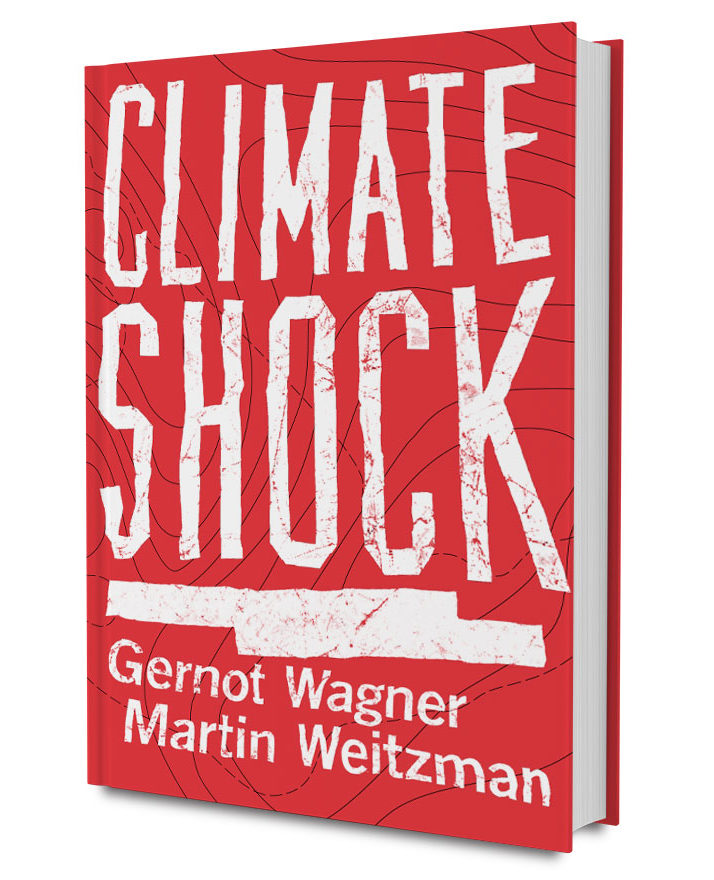If you had a 10 percent chance of having a fatal car accident, you’d take necessary precautions. If your finances had a 10 percent chance of suffering a severe loss, you’d reevaluate your assets. So if we know the world is warming and there’s a 10 percent chance this might eventually lead to a catastrophe beyond anything we could imagine, why aren’t we doing more about climate change right now? We insure our lives against an uncertain future–why not our planet?
In Climate Shock, Gernot Wagner and Martin Weitzman explore in lively, clear terms the likely repercussions of a hotter planet, drawing on and expanding from work previously unavailable to general audiences. They show that the longer we wait to act, the more likely an extreme event will happen. A city might go underwater. A rogue nation might shoot particles into the Earth’s atmosphere, geoengineering cooler temperatures. Zeroing in on the unknown extreme risks that may yet dwarf all else, the authors look at how economic forces that make sensible climate policies difficult to enact, make radical would-be fixes like geoengineering all the more probable. What we know about climate change is alarming enough. What we don’t know about the extreme risks could be far more dangerous. Wagner and Weitzman help readers understand that we need to think about climate change in the same way that we think about insurance–as a risk management problem, only here on a global scale.
Demonstrating that climate change can and should be dealt with–and what could happen if we don’t do so — Climate Shock tackles the defining environmental and public policy issue of our time.
More on Climate Shock:
- TEDx talk: “From Climate Shock to Geoengineering“
- One of “The 5 best books on Existential Risks” per the Centre for the Study of Existential Risk at the University of Cambridge (September 2018)
- Geoffrey Heal in Journal of Economic Literature (September 2017)
- Austria’s Natural Science Book of the Year 2017
- “Klimaschock ist ein wohlinformierter…leidenschaftlicher Aufruf zu Handeln,” Buchkultur. [German: “Climate Shock is a well informed…passionate call for action.”]
- Klimaschock Gespräch mit Helmut Kretzl in den Salzburger Nachrichten, einschließlich Artikel auf Seite 1: “Das Geld, die Kosten und das Klima“
- Klimaschock Gespräch mit Oliver Tanzer und Christoph Müller in Die Furche, “Wie ein Treffen von Alkoholikern“
- ORF Ö1 Radio Interview with Elfi Geiblinger, “Von Tag zu Tag“
- “Förderung für Ölheizungen ist Irrsinn,” German interview and book review in Austrian daily Der Standard.
- Bionic Planet podcasts, part 1 & part 2
- Climate Shock conversation with WRFI’s The Forecast
- “ExxonMobil weiß irgendetwas, das wir nicht wissen,” German interview in profil.
- Klimaschock Gespräch mit Wolfgang Ritschl, ORF Ö1 Radio Kontext
- “Planetare Chemotherapie,” German interview in trend.
- Review by Peter Kirby-Harris for Bright Blue: “Weitzman and Wagner offer a profound insight.”
- Conversation with Romesh Vaitilingam, aired as Vox EU podcast
- Climate Shock is among The Globalist’s Top 10 books of 2015
- “El Shock Climático“—Spanish interview with Ballena Blanca
- Nature recommends five books to climate negotiators in Paris, Climate Shock among them
- PBS NewsHour features a Q&A analyzing the Paris climate negotiations
- Climate Shock is among the Financial Times‘ Best Books of 2015
- Conversation with Richard Davies and Jim Meigs, on “How Do We Fix It?“
- German “Klimaschock” interview in Universum Magazin
- Climate Shock is on the Financial Times and McKinsey Business Book of the Year Award 2015 longlist
- Peter Orszag reviews Climate Shock in his Bloomberg View column, subsequently coining the “11/11 climate combo“: an 11 percent chance of eventual 11 degrees Fahrenheit change
- PBS NewsHour features Climate Shock in a segment on “The economic options for combating climate change”
- Climate Shock is a Financial Times Summer Book 2015.
- Martin Sandbu calls Climate Shock “a terrific new book” in the Financial Times “Free Lunch” column.
- Martin Wolf discusses Climate Shock in the Financial Times, calling it “punchy” in “Why climate uncertainty justifies action” (June 9, 2015), and highlighting its discussion on geoengineering in “A moonshot to save a warming planet” (June 23, 2015).
- Russ Roberts talks to Martin L. Weitzman on EconTalk: “Your book is a breath of fresh air.”
- ‘Review of reviews‘ by Rachael Sotos for the Carbon Tax Center
- Review by William D. Nordhaus in The New York Review of Books
- strategy + business review “It’s Getting Hot in Here” by Katie Fehrenbacher
- Globalist op-ed on “Climate Change: Like an Asteroid“
- Foreign Affairs essay on “Why Environmental Action Is so Hard“
- Institute for New Economic Thinking blog post on “New Climate-Economic Thinking“
- Chronicle of Higher Education review by John Quiggin on “Gambling on Climate Change“
- Ensia article on “How does climate stack up against other worst-case scenarios?“
- Globalist op-ed on “Errors of commission versus errors of omission“
- Financial Times review by Pilita Clark (Chinese version via FT中文网)
- Salon feature article on why “The planet won’t notice you recycle, and your vote doesn’t count“
- New York Times Economic View column by Robert J. Shiller on “How Idealism, Expressed in Concrete Steps, Can Fight Climate Change“
- Times Higher Education review by Swenja Surminski
- Prospect Magazine Q&A with Jonathan Derbyshire
- Atlantic essay on how “What we know about climate change is bad enough; what we don’t could make it even worse“
- Nature review (“Economists Gernot Wagner and Martin Weitzman deliver a highvoltage shock in their analysis of the costs of climate change.”)
- Ensia article on “How to avoid the looming climate shock” (adapting preface and bits of the conclusion from the book)
- Publishers Weekly review (“Top 10: Business & Economics” for Spring 2015)
- New York Times op-ed on “Inconvenient Uncertainties“
- Wall Street Journal Ideas Market op-ed on Sandy as the “Fat Tail” of Climate Change
- Foreign Policy article on “Playing God“
